Report: Aboriginal Sustainability and Development Challenges
VerifiedAdded on 2021/05/31
|8
|1757
|87
Report
AI Summary
This report delves into the complex issue of sustainability within Australian Aboriginal communities, emphasizing the interplay between ecological challenges, development needs, and cultural knowledge. It highlights the importance of Aboriginal traditional ecological knowledge and its contribution to sustainable development. The report examines the current practices of sustainability, including conservation efforts, appropriate development initiatives, democratic participation, and social equity. It identifies key challenges such as socio-economic exclusion, racism, and ambiguous governance structures. Furthermore, the report explores future prospects for sustainability, including financial adjustments, strategic decision-making, and community participation agreements. It concludes by advocating for a sustainable framework that respects and integrates Aboriginal perspectives to achieve lasting positive outcomes. The report references relevant legislation and frameworks, providing a comprehensive analysis of the topic.
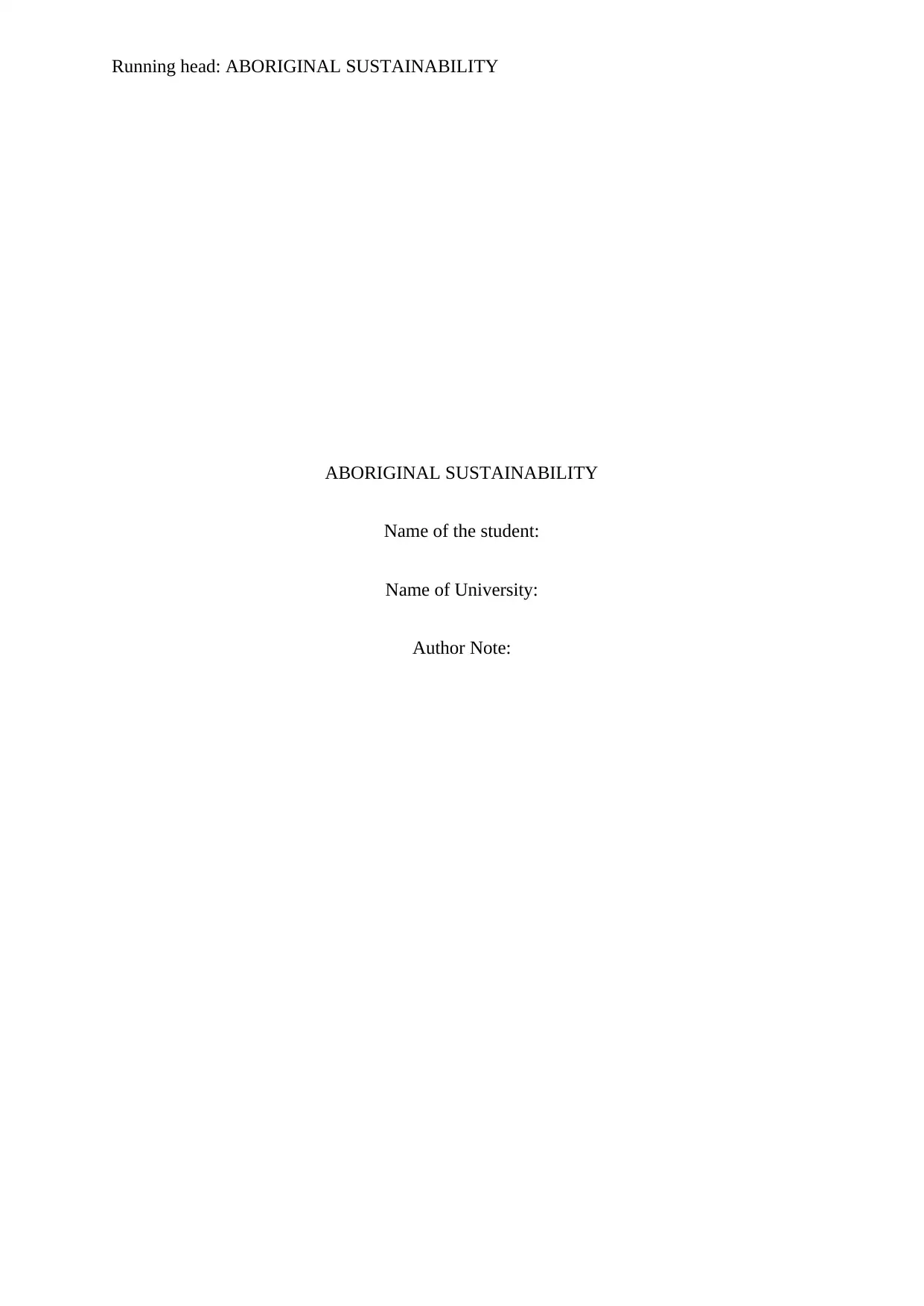
Running head: ABORIGINAL SUSTAINABILITY
ABORIGINAL SUSTAINABILITY
Name of the student:
Name of University:
Author Note:
ABORIGINAL SUSTAINABILITY
Name of the student:
Name of University:
Author Note:
Paraphrase This Document
Need a fresh take? Get an instant paraphrase of this document with our AI Paraphraser
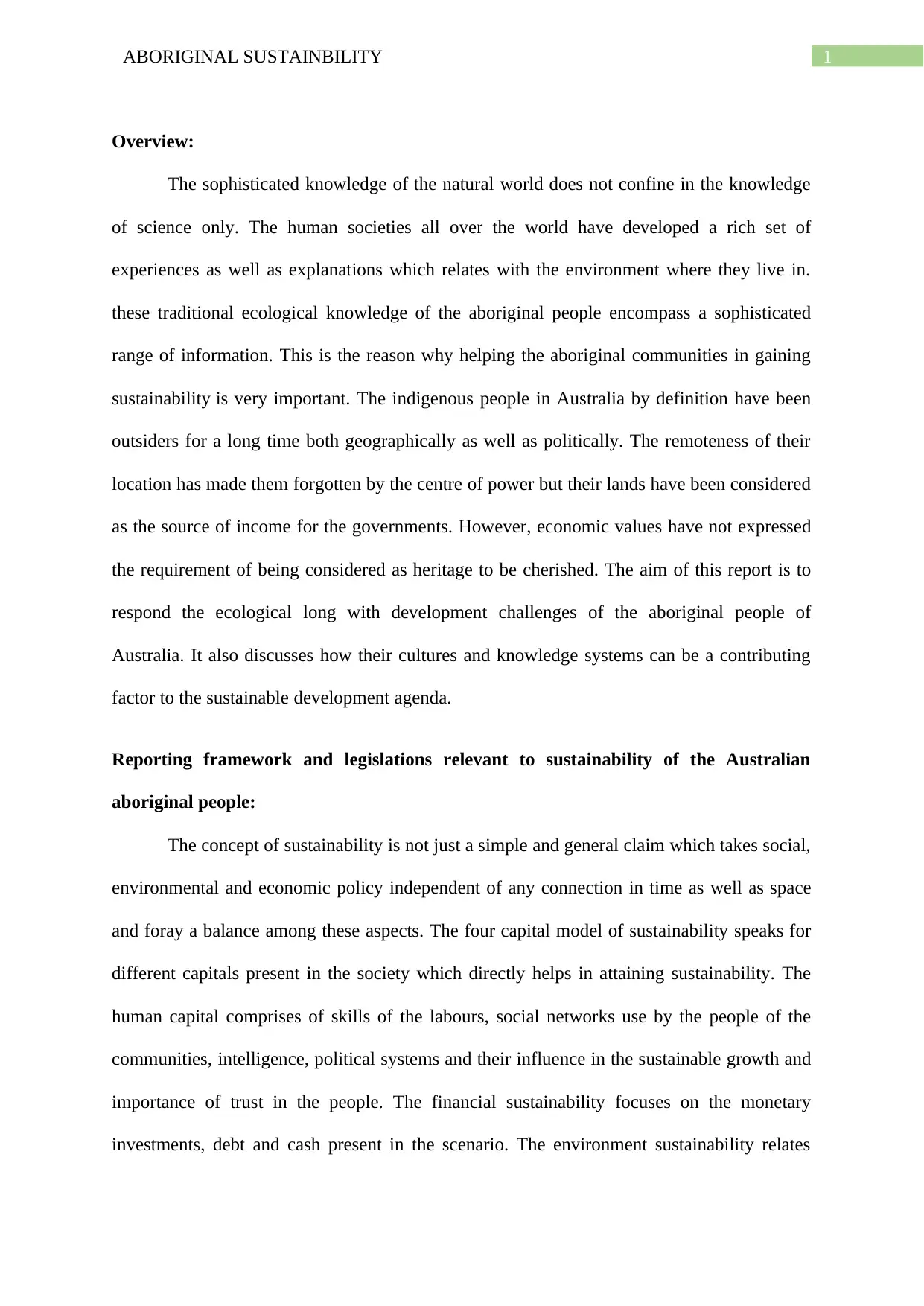
1ABORIGINAL SUSTAINBILITY
Overview:
The sophisticated knowledge of the natural world does not confine in the knowledge
of science only. The human societies all over the world have developed a rich set of
experiences as well as explanations which relates with the environment where they live in.
these traditional ecological knowledge of the aboriginal people encompass a sophisticated
range of information. This is the reason why helping the aboriginal communities in gaining
sustainability is very important. The indigenous people in Australia by definition have been
outsiders for a long time both geographically as well as politically. The remoteness of their
location has made them forgotten by the centre of power but their lands have been considered
as the source of income for the governments. However, economic values have not expressed
the requirement of being considered as heritage to be cherished. The aim of this report is to
respond the ecological long with development challenges of the aboriginal people of
Australia. It also discusses how their cultures and knowledge systems can be a contributing
factor to the sustainable development agenda.
Reporting framework and legislations relevant to sustainability of the Australian
aboriginal people:
The concept of sustainability is not just a simple and general claim which takes social,
environmental and economic policy independent of any connection in time as well as space
and foray a balance among these aspects. The four capital model of sustainability speaks for
different capitals present in the society which directly helps in attaining sustainability. The
human capital comprises of skills of the labours, social networks use by the people of the
communities, intelligence, political systems and their influence in the sustainable growth and
importance of trust in the people. The financial sustainability focuses on the monetary
investments, debt and cash present in the scenario. The environment sustainability relates
Overview:
The sophisticated knowledge of the natural world does not confine in the knowledge
of science only. The human societies all over the world have developed a rich set of
experiences as well as explanations which relates with the environment where they live in.
these traditional ecological knowledge of the aboriginal people encompass a sophisticated
range of information. This is the reason why helping the aboriginal communities in gaining
sustainability is very important. The indigenous people in Australia by definition have been
outsiders for a long time both geographically as well as politically. The remoteness of their
location has made them forgotten by the centre of power but their lands have been considered
as the source of income for the governments. However, economic values have not expressed
the requirement of being considered as heritage to be cherished. The aim of this report is to
respond the ecological long with development challenges of the aboriginal people of
Australia. It also discusses how their cultures and knowledge systems can be a contributing
factor to the sustainable development agenda.
Reporting framework and legislations relevant to sustainability of the Australian
aboriginal people:
The concept of sustainability is not just a simple and general claim which takes social,
environmental and economic policy independent of any connection in time as well as space
and foray a balance among these aspects. The four capital model of sustainability speaks for
different capitals present in the society which directly helps in attaining sustainability. The
human capital comprises of skills of the labours, social networks use by the people of the
communities, intelligence, political systems and their influence in the sustainable growth and
importance of trust in the people. The financial sustainability focuses on the monetary
investments, debt and cash present in the scenario. The environment sustainability relates
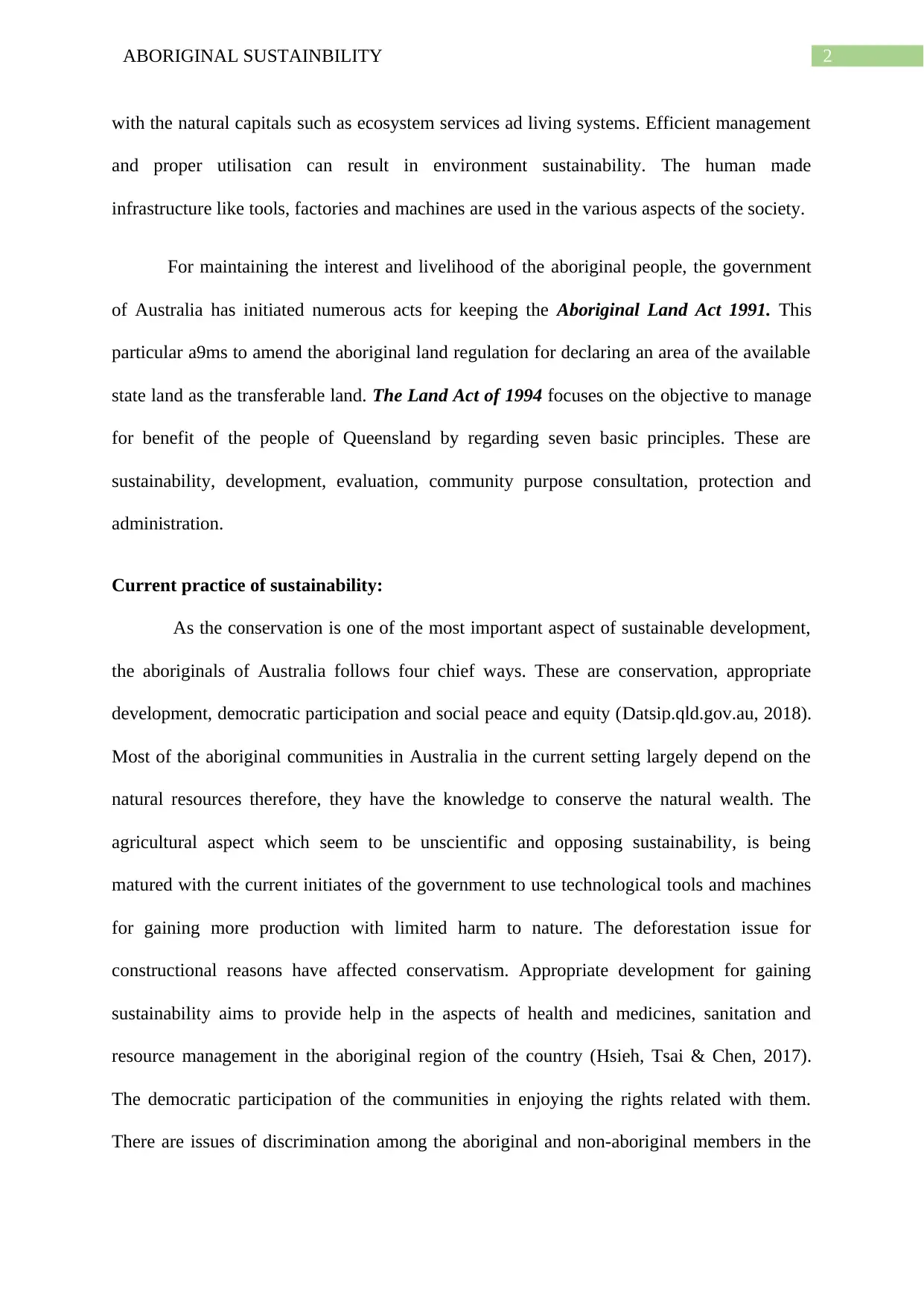
2ABORIGINAL SUSTAINBILITY
with the natural capitals such as ecosystem services ad living systems. Efficient management
and proper utilisation can result in environment sustainability. The human made
infrastructure like tools, factories and machines are used in the various aspects of the society.
For maintaining the interest and livelihood of the aboriginal people, the government
of Australia has initiated numerous acts for keeping the Aboriginal Land Act 1991. This
particular a9ms to amend the aboriginal land regulation for declaring an area of the available
state land as the transferable land. The Land Act of 1994 focuses on the objective to manage
for benefit of the people of Queensland by regarding seven basic principles. These are
sustainability, development, evaluation, community purpose consultation, protection and
administration.
Current practice of sustainability:
As the conservation is one of the most important aspect of sustainable development,
the aboriginals of Australia follows four chief ways. These are conservation, appropriate
development, democratic participation and social peace and equity (Datsip.qld.gov.au, 2018).
Most of the aboriginal communities in Australia in the current setting largely depend on the
natural resources therefore, they have the knowledge to conserve the natural wealth. The
agricultural aspect which seem to be unscientific and opposing sustainability, is being
matured with the current initiates of the government to use technological tools and machines
for gaining more production with limited harm to nature. The deforestation issue for
constructional reasons have affected conservatism. Appropriate development for gaining
sustainability aims to provide help in the aspects of health and medicines, sanitation and
resource management in the aboriginal region of the country (Hsieh, Tsai & Chen, 2017).
The democratic participation of the communities in enjoying the rights related with them.
There are issues of discrimination among the aboriginal and non-aboriginal members in the
with the natural capitals such as ecosystem services ad living systems. Efficient management
and proper utilisation can result in environment sustainability. The human made
infrastructure like tools, factories and machines are used in the various aspects of the society.
For maintaining the interest and livelihood of the aboriginal people, the government
of Australia has initiated numerous acts for keeping the Aboriginal Land Act 1991. This
particular a9ms to amend the aboriginal land regulation for declaring an area of the available
state land as the transferable land. The Land Act of 1994 focuses on the objective to manage
for benefit of the people of Queensland by regarding seven basic principles. These are
sustainability, development, evaluation, community purpose consultation, protection and
administration.
Current practice of sustainability:
As the conservation is one of the most important aspect of sustainable development,
the aboriginals of Australia follows four chief ways. These are conservation, appropriate
development, democratic participation and social peace and equity (Datsip.qld.gov.au, 2018).
Most of the aboriginal communities in Australia in the current setting largely depend on the
natural resources therefore, they have the knowledge to conserve the natural wealth. The
agricultural aspect which seem to be unscientific and opposing sustainability, is being
matured with the current initiates of the government to use technological tools and machines
for gaining more production with limited harm to nature. The deforestation issue for
constructional reasons have affected conservatism. Appropriate development for gaining
sustainability aims to provide help in the aspects of health and medicines, sanitation and
resource management in the aboriginal region of the country (Hsieh, Tsai & Chen, 2017).
The democratic participation of the communities in enjoying the rights related with them.
There are issues of discrimination among the aboriginal and non-aboriginal members in the
⊘ This is a preview!⊘
Do you want full access?
Subscribe today to unlock all pages.

Trusted by 1+ million students worldwide
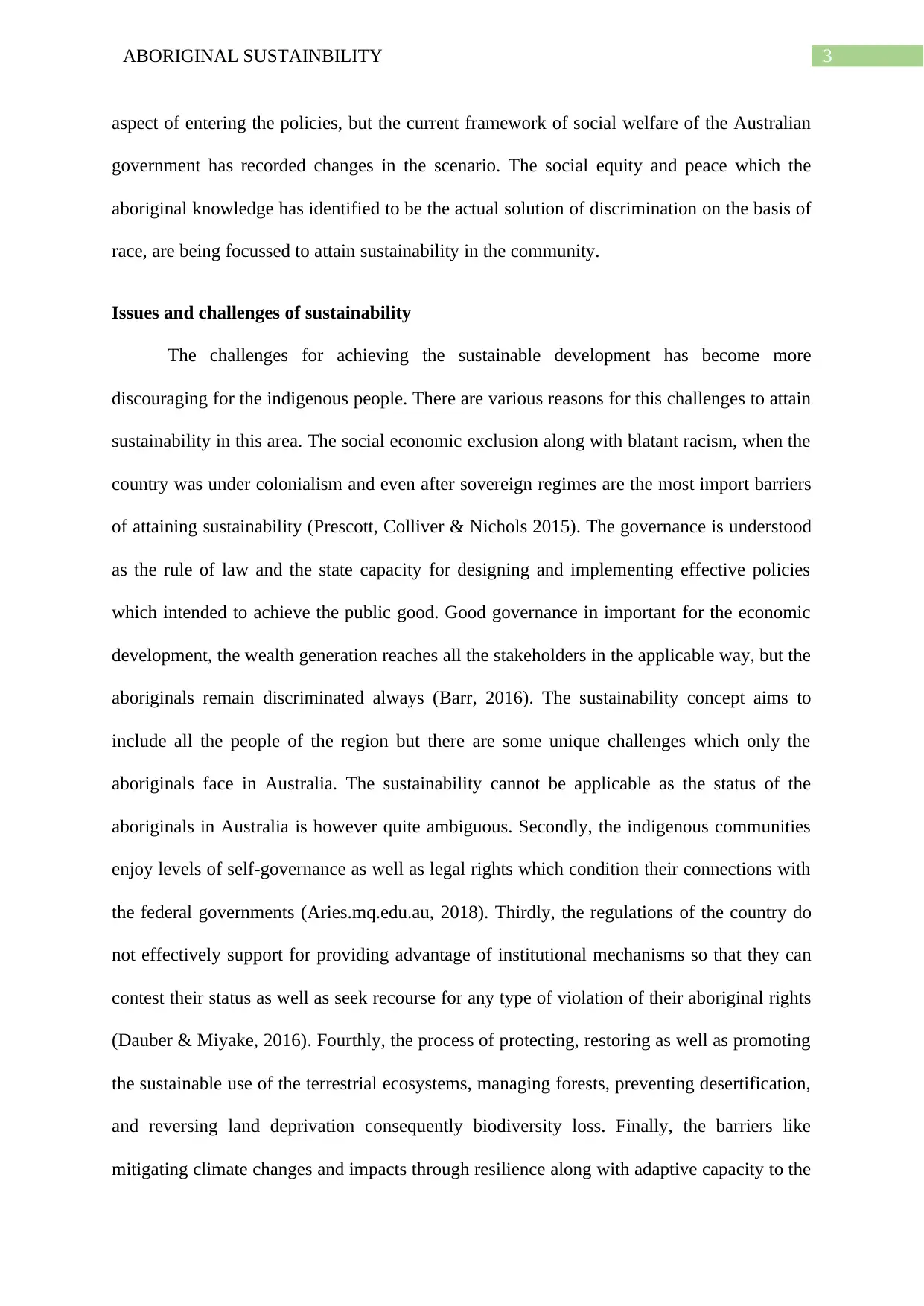
3ABORIGINAL SUSTAINBILITY
aspect of entering the policies, but the current framework of social welfare of the Australian
government has recorded changes in the scenario. The social equity and peace which the
aboriginal knowledge has identified to be the actual solution of discrimination on the basis of
race, are being focussed to attain sustainability in the community.
Issues and challenges of sustainability
The challenges for achieving the sustainable development has become more
discouraging for the indigenous people. There are various reasons for this challenges to attain
sustainability in this area. The social economic exclusion along with blatant racism, when the
country was under colonialism and even after sovereign regimes are the most import barriers
of attaining sustainability (Prescott, Colliver & Nichols 2015). The governance is understood
as the rule of law and the state capacity for designing and implementing effective policies
which intended to achieve the public good. Good governance in important for the economic
development, the wealth generation reaches all the stakeholders in the applicable way, but the
aboriginals remain discriminated always (Barr, 2016). The sustainability concept aims to
include all the people of the region but there are some unique challenges which only the
aboriginals face in Australia. The sustainability cannot be applicable as the status of the
aboriginals in Australia is however quite ambiguous. Secondly, the indigenous communities
enjoy levels of self-governance as well as legal rights which condition their connections with
the federal governments (Aries.mq.edu.au, 2018). Thirdly, the regulations of the country do
not effectively support for providing advantage of institutional mechanisms so that they can
contest their status as well as seek recourse for any type of violation of their aboriginal rights
(Dauber & Miyake, 2016). Fourthly, the process of protecting, restoring as well as promoting
the sustainable use of the terrestrial ecosystems, managing forests, preventing desertification,
and reversing land deprivation consequently biodiversity loss. Finally, the barriers like
mitigating climate changes and impacts through resilience along with adaptive capacity to the
aspect of entering the policies, but the current framework of social welfare of the Australian
government has recorded changes in the scenario. The social equity and peace which the
aboriginal knowledge has identified to be the actual solution of discrimination on the basis of
race, are being focussed to attain sustainability in the community.
Issues and challenges of sustainability
The challenges for achieving the sustainable development has become more
discouraging for the indigenous people. There are various reasons for this challenges to attain
sustainability in this area. The social economic exclusion along with blatant racism, when the
country was under colonialism and even after sovereign regimes are the most import barriers
of attaining sustainability (Prescott, Colliver & Nichols 2015). The governance is understood
as the rule of law and the state capacity for designing and implementing effective policies
which intended to achieve the public good. Good governance in important for the economic
development, the wealth generation reaches all the stakeholders in the applicable way, but the
aboriginals remain discriminated always (Barr, 2016). The sustainability concept aims to
include all the people of the region but there are some unique challenges which only the
aboriginals face in Australia. The sustainability cannot be applicable as the status of the
aboriginals in Australia is however quite ambiguous. Secondly, the indigenous communities
enjoy levels of self-governance as well as legal rights which condition their connections with
the federal governments (Aries.mq.edu.au, 2018). Thirdly, the regulations of the country do
not effectively support for providing advantage of institutional mechanisms so that they can
contest their status as well as seek recourse for any type of violation of their aboriginal rights
(Dauber & Miyake, 2016). Fourthly, the process of protecting, restoring as well as promoting
the sustainable use of the terrestrial ecosystems, managing forests, preventing desertification,
and reversing land deprivation consequently biodiversity loss. Finally, the barriers like
mitigating climate changes and impacts through resilience along with adaptive capacity to the
Paraphrase This Document
Need a fresh take? Get an instant paraphrase of this document with our AI Paraphraser
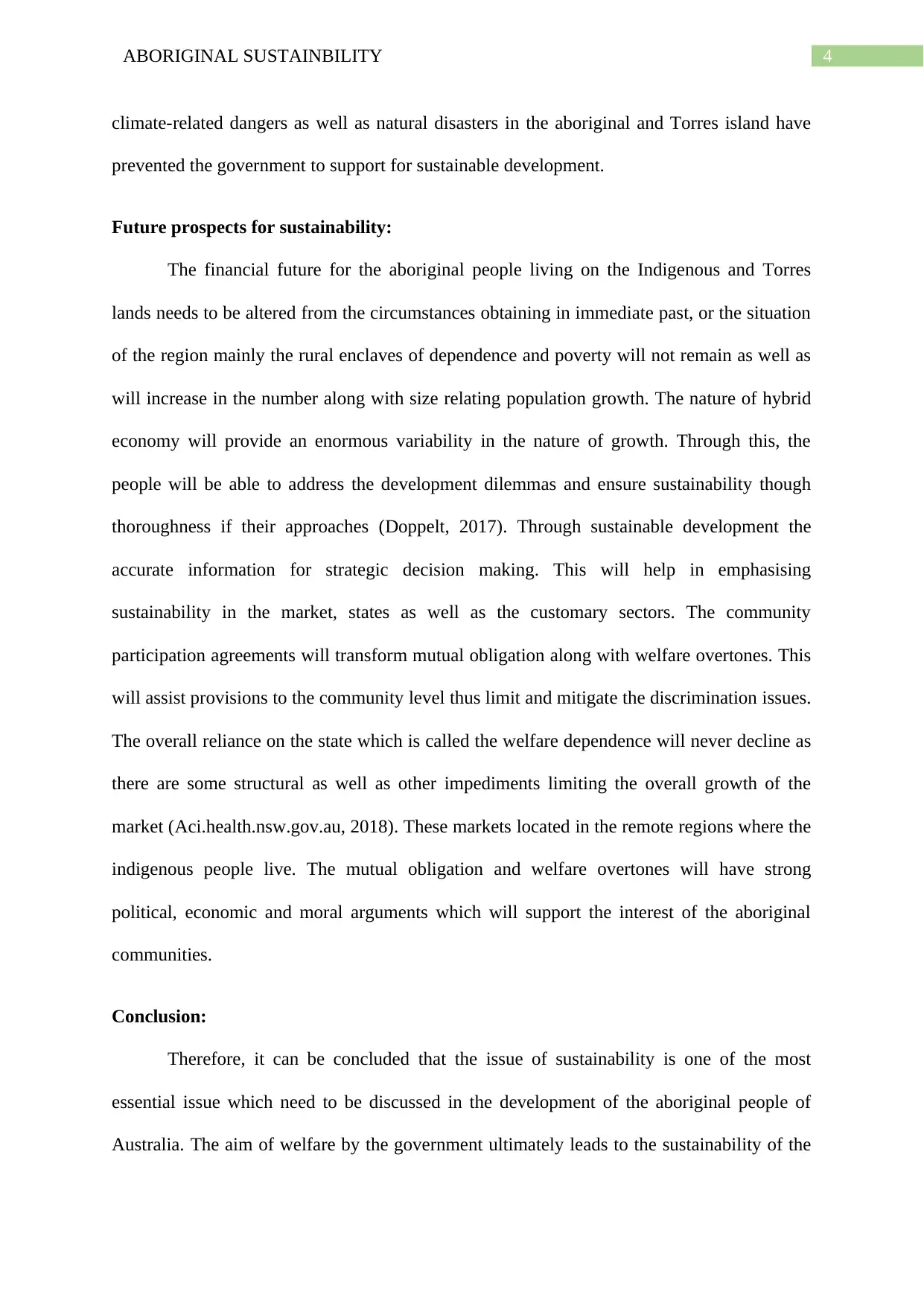
4ABORIGINAL SUSTAINBILITY
climate-related dangers as well as natural disasters in the aboriginal and Torres island have
prevented the government to support for sustainable development.
Future prospects for sustainability:
The financial future for the aboriginal people living on the Indigenous and Torres
lands needs to be altered from the circumstances obtaining in immediate past, or the situation
of the region mainly the rural enclaves of dependence and poverty will not remain as well as
will increase in the number along with size relating population growth. The nature of hybrid
economy will provide an enormous variability in the nature of growth. Through this, the
people will be able to address the development dilemmas and ensure sustainability though
thoroughness if their approaches (Doppelt, 2017). Through sustainable development the
accurate information for strategic decision making. This will help in emphasising
sustainability in the market, states as well as the customary sectors. The community
participation agreements will transform mutual obligation along with welfare overtones. This
will assist provisions to the community level thus limit and mitigate the discrimination issues.
The overall reliance on the state which is called the welfare dependence will never decline as
there are some structural as well as other impediments limiting the overall growth of the
market (Aci.health.nsw.gov.au, 2018). These markets located in the remote regions where the
indigenous people live. The mutual obligation and welfare overtones will have strong
political, economic and moral arguments which will support the interest of the aboriginal
communities.
Conclusion:
Therefore, it can be concluded that the issue of sustainability is one of the most
essential issue which need to be discussed in the development of the aboriginal people of
Australia. The aim of welfare by the government ultimately leads to the sustainability of the
climate-related dangers as well as natural disasters in the aboriginal and Torres island have
prevented the government to support for sustainable development.
Future prospects for sustainability:
The financial future for the aboriginal people living on the Indigenous and Torres
lands needs to be altered from the circumstances obtaining in immediate past, or the situation
of the region mainly the rural enclaves of dependence and poverty will not remain as well as
will increase in the number along with size relating population growth. The nature of hybrid
economy will provide an enormous variability in the nature of growth. Through this, the
people will be able to address the development dilemmas and ensure sustainability though
thoroughness if their approaches (Doppelt, 2017). Through sustainable development the
accurate information for strategic decision making. This will help in emphasising
sustainability in the market, states as well as the customary sectors. The community
participation agreements will transform mutual obligation along with welfare overtones. This
will assist provisions to the community level thus limit and mitigate the discrimination issues.
The overall reliance on the state which is called the welfare dependence will never decline as
there are some structural as well as other impediments limiting the overall growth of the
market (Aci.health.nsw.gov.au, 2018). These markets located in the remote regions where the
indigenous people live. The mutual obligation and welfare overtones will have strong
political, economic and moral arguments which will support the interest of the aboriginal
communities.
Conclusion:
Therefore, it can be concluded that the issue of sustainability is one of the most
essential issue which need to be discussed in the development of the aboriginal people of
Australia. The aim of welfare by the government ultimately leads to the sustainability of the
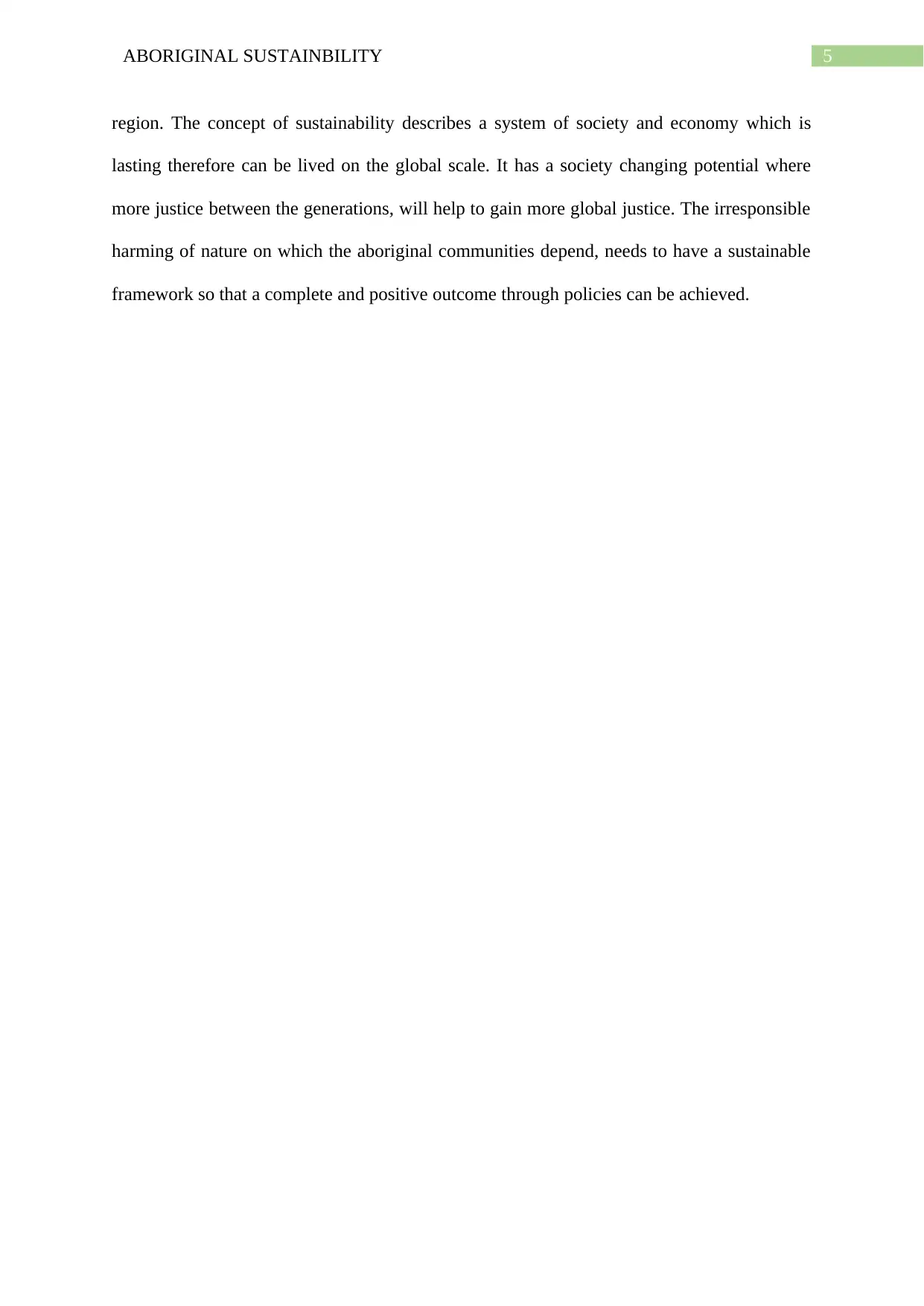
5ABORIGINAL SUSTAINBILITY
region. The concept of sustainability describes a system of society and economy which is
lasting therefore can be lived on the global scale. It has a society changing potential where
more justice between the generations, will help to gain more global justice. The irresponsible
harming of nature on which the aboriginal communities depend, needs to have a sustainable
framework so that a complete and positive outcome through policies can be achieved.
region. The concept of sustainability describes a system of society and economy which is
lasting therefore can be lived on the global scale. It has a society changing potential where
more justice between the generations, will help to gain more global justice. The irresponsible
harming of nature on which the aboriginal communities depend, needs to have a sustainable
framework so that a complete and positive outcome through policies can be achieved.
⊘ This is a preview!⊘
Do you want full access?
Subscribe today to unlock all pages.

Trusted by 1+ million students worldwide
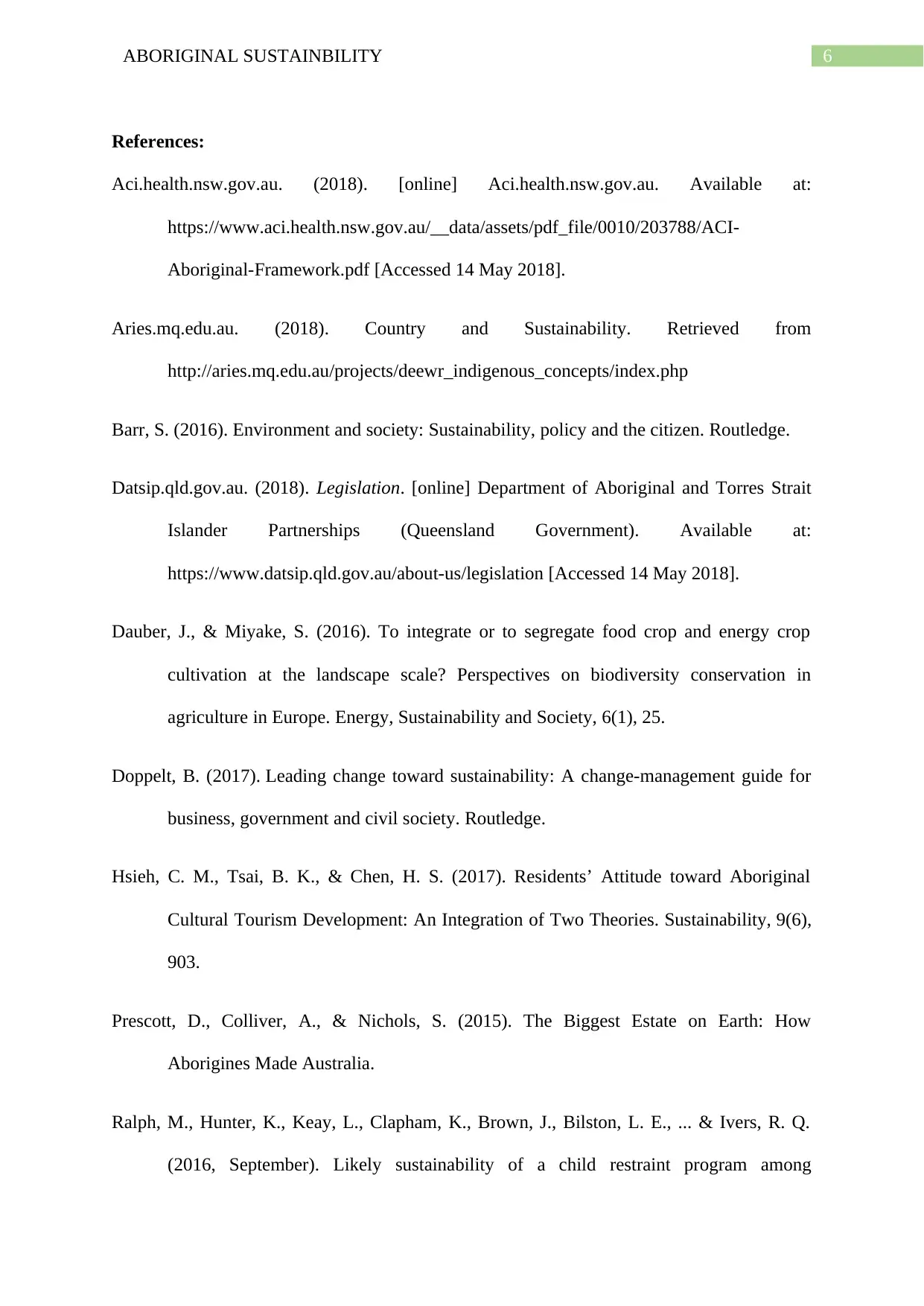
6ABORIGINAL SUSTAINBILITY
References:
Aci.health.nsw.gov.au. (2018). [online] Aci.health.nsw.gov.au. Available at:
https://www.aci.health.nsw.gov.au/__data/assets/pdf_file/0010/203788/ACI-
Aboriginal-Framework.pdf [Accessed 14 May 2018].
Aries.mq.edu.au. (2018). Country and Sustainability. Retrieved from
http://aries.mq.edu.au/projects/deewr_indigenous_concepts/index.php
Barr, S. (2016). Environment and society: Sustainability, policy and the citizen. Routledge.
Datsip.qld.gov.au. (2018). Legislation. [online] Department of Aboriginal and Torres Strait
Islander Partnerships (Queensland Government). Available at:
https://www.datsip.qld.gov.au/about-us/legislation [Accessed 14 May 2018].
Dauber, J., & Miyake, S. (2016). To integrate or to segregate food crop and energy crop
cultivation at the landscape scale? Perspectives on biodiversity conservation in
agriculture in Europe. Energy, Sustainability and Society, 6(1), 25.
Doppelt, B. (2017). Leading change toward sustainability: A change-management guide for
business, government and civil society. Routledge.
Hsieh, C. M., Tsai, B. K., & Chen, H. S. (2017). Residents’ Attitude toward Aboriginal
Cultural Tourism Development: An Integration of Two Theories. Sustainability, 9(6),
903.
Prescott, D., Colliver, A., & Nichols, S. (2015). The Biggest Estate on Earth: How
Aborigines Made Australia.
Ralph, M., Hunter, K., Keay, L., Clapham, K., Brown, J., Bilston, L. E., ... & Ivers, R. Q.
(2016, September). Likely sustainability of a child restraint program among
References:
Aci.health.nsw.gov.au. (2018). [online] Aci.health.nsw.gov.au. Available at:
https://www.aci.health.nsw.gov.au/__data/assets/pdf_file/0010/203788/ACI-
Aboriginal-Framework.pdf [Accessed 14 May 2018].
Aries.mq.edu.au. (2018). Country and Sustainability. Retrieved from
http://aries.mq.edu.au/projects/deewr_indigenous_concepts/index.php
Barr, S. (2016). Environment and society: Sustainability, policy and the citizen. Routledge.
Datsip.qld.gov.au. (2018). Legislation. [online] Department of Aboriginal and Torres Strait
Islander Partnerships (Queensland Government). Available at:
https://www.datsip.qld.gov.au/about-us/legislation [Accessed 14 May 2018].
Dauber, J., & Miyake, S. (2016). To integrate or to segregate food crop and energy crop
cultivation at the landscape scale? Perspectives on biodiversity conservation in
agriculture in Europe. Energy, Sustainability and Society, 6(1), 25.
Doppelt, B. (2017). Leading change toward sustainability: A change-management guide for
business, government and civil society. Routledge.
Hsieh, C. M., Tsai, B. K., & Chen, H. S. (2017). Residents’ Attitude toward Aboriginal
Cultural Tourism Development: An Integration of Two Theories. Sustainability, 9(6),
903.
Prescott, D., Colliver, A., & Nichols, S. (2015). The Biggest Estate on Earth: How
Aborigines Made Australia.
Ralph, M., Hunter, K., Keay, L., Clapham, K., Brown, J., Bilston, L. E., ... & Ivers, R. Q.
(2016, September). Likely sustainability of a child restraint program among
Paraphrase This Document
Need a fresh take? Get an instant paraphrase of this document with our AI Paraphraser
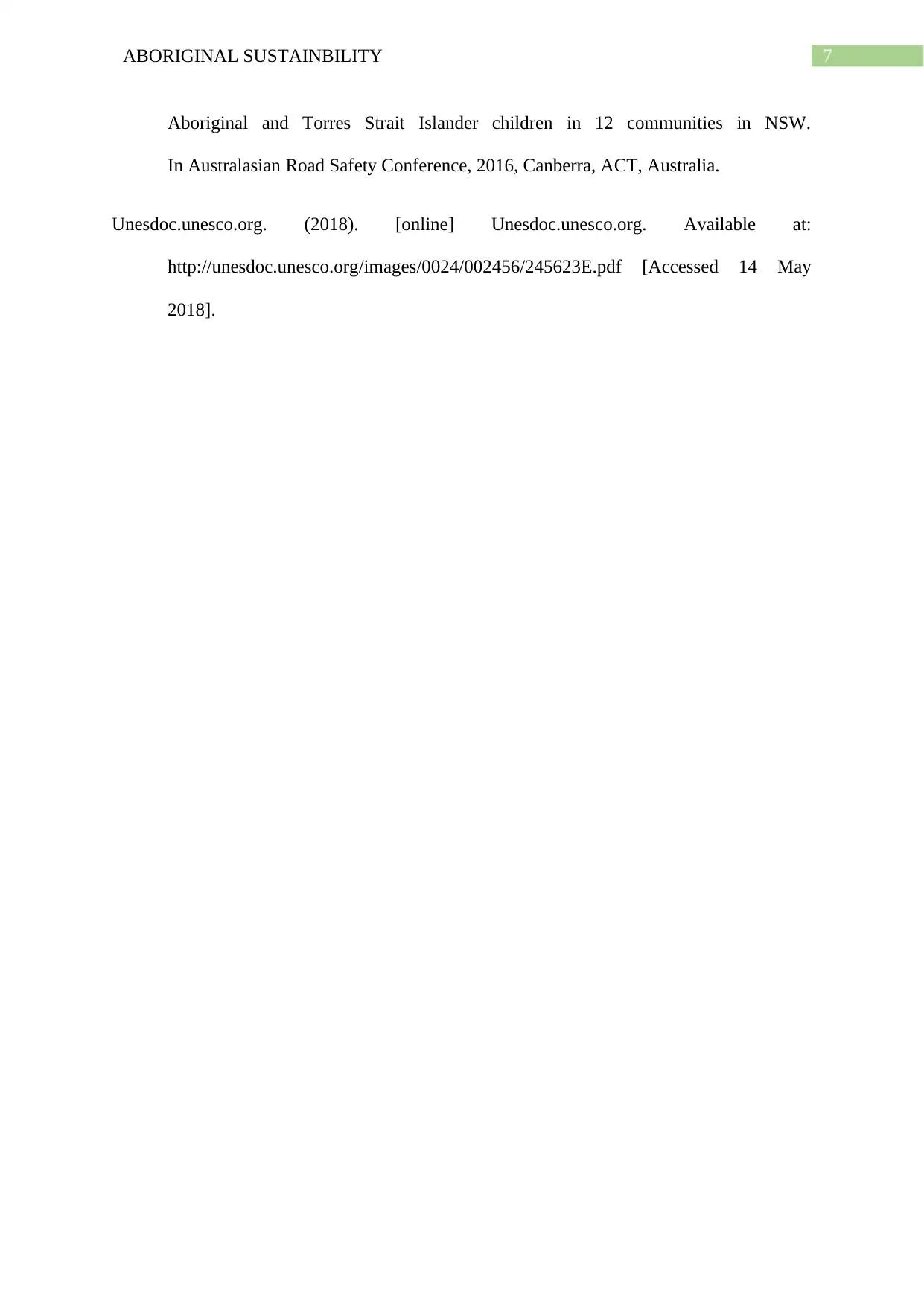
7ABORIGINAL SUSTAINBILITY
Aboriginal and Torres Strait Islander children in 12 communities in NSW.
In Australasian Road Safety Conference, 2016, Canberra, ACT, Australia.
Unesdoc.unesco.org. (2018). [online] Unesdoc.unesco.org. Available at:
http://unesdoc.unesco.org/images/0024/002456/245623E.pdf [Accessed 14 May
2018].
Aboriginal and Torres Strait Islander children in 12 communities in NSW.
In Australasian Road Safety Conference, 2016, Canberra, ACT, Australia.
Unesdoc.unesco.org. (2018). [online] Unesdoc.unesco.org. Available at:
http://unesdoc.unesco.org/images/0024/002456/245623E.pdf [Accessed 14 May
2018].
1 out of 8
Related Documents
Your All-in-One AI-Powered Toolkit for Academic Success.
+13062052269
info@desklib.com
Available 24*7 on WhatsApp / Email
![[object Object]](/_next/static/media/star-bottom.7253800d.svg)
Unlock your academic potential
Copyright © 2020–2026 A2Z Services. All Rights Reserved. Developed and managed by ZUCOL.





